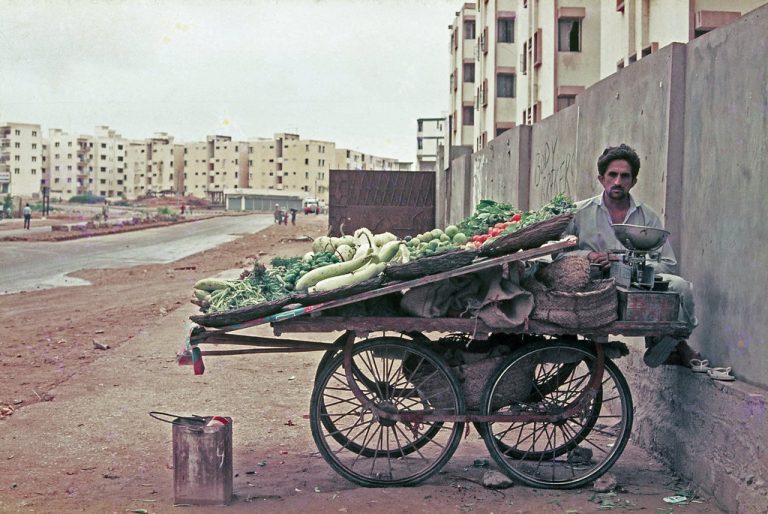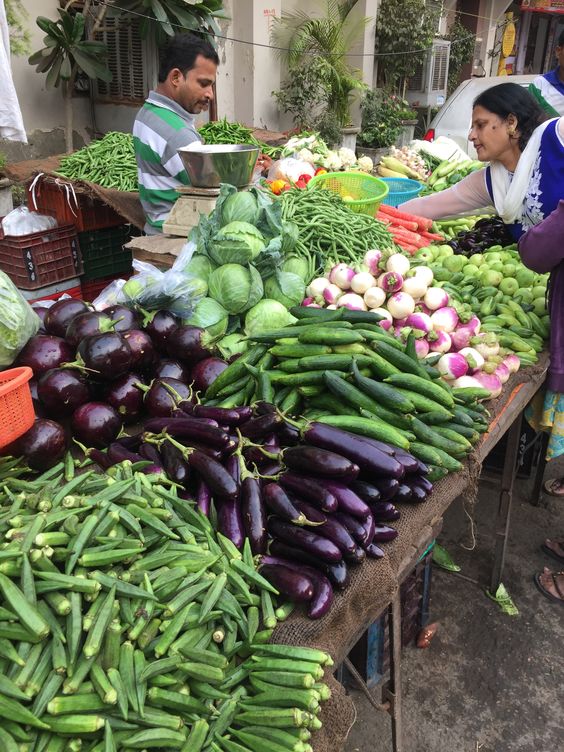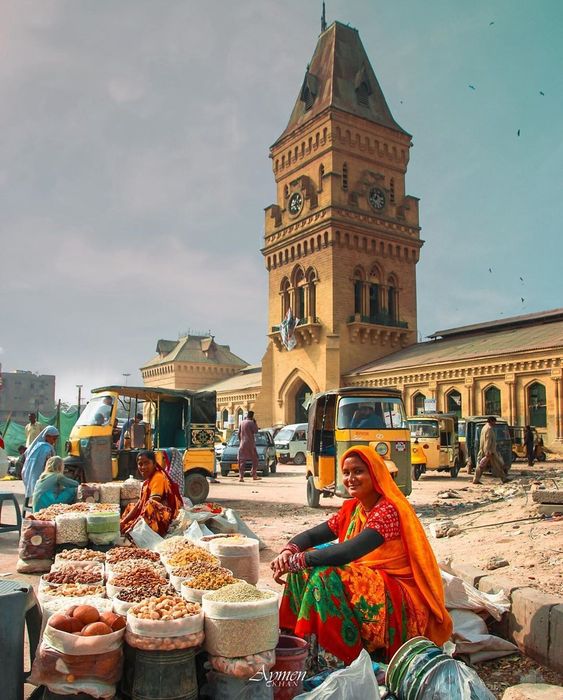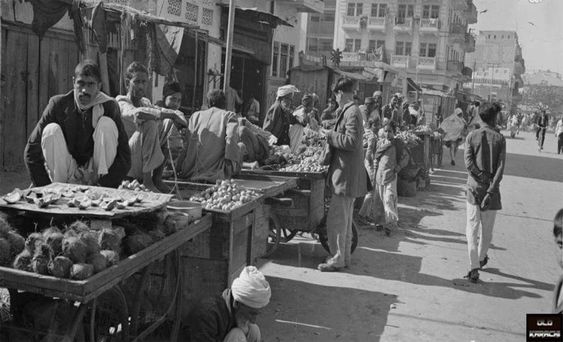
A street vendor makes a significant contribution to society, as he delivers the goods door to door.
By Hira Sahito| Asifa Iqbal | Nasreen Lashari
The term “street hawker” is used for a person who sells things by calling on people’s houses or standing on the street. Street peddlers are commonly seen when traveling on buses, trains and other forms of public transport. They are sometimes seen in the morning selling newspapers, various items such as toys, clothes, fruits, vegetables and other edible items. This sales process is done by shouting out the names of the specific items they are selling. They are usually seen with a cart or basket full of cheap goods placed on their head. They do their job quite well because they have the knowledge of how to buy goods from a particular place and sell those goods to interested consumers. Their stores are mobile and usually temporary.
They face problems of eviction, payment of bribes, inability to access various government facilities, lack of facilities like toilets, lightning, lack of social security etc.
In a global perspective, street hawking is an informal economic activity found in urban areas around the world, especially in ASEAN. The informal sector is one of the discussion points that will be developed under the ASEAN Economic Community (AEC) vision. The capital cities of the two founding ASEAN countries are Jakarta and Kuala Lumpur. Both nations are experiencing the same problem. They have principles that are essentially the same, but their implementation is different.

It is believed that in Malaysia the street hawking dates back to the British colonial era. As can be observed from the licensing and tax control of street falconry, it is recognized and regulated by the government as an economic part of Malaysia. Under the Local Government Act 1976, the Department for Hawkers and Petty Traders is the designation given to any unit that is itinerant, static or temporary and offers items for sale or sets up a stall offering goods for sale in Malaysia (DHPT). According to Bhowmik and Hermon, “the DHPT is normally in charge of updating, developing and managing hawkers to align with the vision of the city.”
In Nigeria, young children, both boys and girls, work almost constantly as street vendors. Sales girls come to towns in groups and spread out across the town to sell their products. Many families survive on the commodities their children scavenge on the streets, markets or roadsides. Salespeople’s lives are in great danger as a result of their activity, especially given the way it is conducted. As a means of survival, young and old people engage in mobile hawking business. Many parents find it difficult to send their children out hawking after school. However, they do this to save money for family needs and for children’s school fees. Nigeria is a nation blessed with quantum oil and an abundance of solid minerals, but the failure of Nigeria’s leaders to put these minerals to good use for the good of all Nigerian citizens has made many people seek any available means of survival. To survive, many ignorant Nigerians with little or no skills always turn to door-to-door sales. If we compare the cost of running a falconry with the cost of renting a shop, it is relatively affordable.
The dangers facing children of street vendors in Nigeria are:
- Kidnapping/rape: When you run falconry for your parents or guardians, minors are easily kidnapped. Many women who sell goods on the street risk being sexually assaulted by street touts.
- Rituals: Girls who sell bananas are often the target of ritual abuse. Some of the kids you send to hawk come home late at night because they were too busy looking for customers and couldn’t afford to come home with unsold products. Some of them come back quite late at night to finish their things because they feel the need to impress their parents. They then turned into the prey of ritual men.
- Road accidents: When people run along the main road trying to sell their wares, God was the one who saved the young and the old. These traders run the risk of being hit by a car while selling their wares.
Without finding new ways to work with these streets vendors, government legislation to end street vending will never succeed. Even if you send an entire battalion to patrol the street, street hawking will immediately resume once the troops leave. It is imperative that their leaders understand the true nature of administration and government. And pass the flag to someone else if you find yourself too narrow-minded to run the country’s affairs. This nation must be prevented from crumbling into oblivion and the government must accept the responsibility of providing a good existence to its people.
Serin Dossa’s Story:
Here is an interview with a Nigerian street vendor: This interview was conducted on September 6, 2019 and uploaded to the Bill Gates YouTube channel. This interview gives an insight into the dangers and difficult life street vendors face.
“My name is Serin Dossa, I live in Ago-Egun community in Lagos, Nigeria. When I wake up in the morning, I cook Koko (porridge) for sale, put it on the fire and let it cook until it is ready for the hawk.
My mother’s first business was selling cocoa and now it’s mine. I earn about 400 Nigerian naira ($1.12) a day. This business is so hard that sometimes I have to borrow money to support it. I do this to support myself and my children. My husband no longer has a job. So I do what I can, I belong to a cooperative society called the Society of God’s Gifts. I try to save, but recently I was sick and I went through all my money, all my savings, the company helps in times like this. You see, it’s usually us women who support the family when there’s a crisis. We also save for our children’s school fees and for our personal needs. Sometimes I feel embarrassed hawking. If I see another business opportunity, I might try it. It is purely up to me to make money. So that my children can survive.”

Pakistan Perspective
In the perspective of Pakistan, many street vendors pass their businesses on to their children; therefore, their small business runs from one generation to the next. According to the survey, “Street vendors form a small part of Pakistan’s economy. Their daily earnings of Rs.1000 works out to nearly Rs.2190 crore per year.” In their respective villages, the number of street vendors is significant because residents do not have access to fresh seasonal fruits and vegetables. They buy fresh produce from the farm, like oranges and guavas, and either routinely set up stalls or go to the villages to sell it there. Villages benefit from not having to travel to cities for food and other necessities. Moreover, it is beneficial for the sellers who earn good money to support their families. Since people buy used sweaters, socks and scarves from these sellers to keep warm in the cold, they are especially successful during the winter. In the sweltering summer heat, merchants help local residents by offering chilled drinks and other food.

In final words, a street vendor makes a significant contribution to society, as he delivers the goods door to door. It is particularly important for isolated areas as it transports the necessities of daily life. Even in the worst weather, he or she makes sure that the products reach their destination. He/she does not get many benefits as they work in the unorganized sector. They are also plagued by the negative effects of poverty. Its influence on society has greatly diminished since the introduction of supermarkets and online shopping. These retailers consume their income. Additionally, many individuals are rude to street vendors and disregard their time and effort. The street vendors are treated poorly because of their financial situation. Everyone must recognize and maintain the dignity of their work. In this regard, policy makers in Pakistan must think about hawkers’ life and take necessary measure so that their standard of life may improve.
__________________
The writers are students of BSSS-III, Anthropology, at Shaheed Zulfiqar Ali Bhutto Institute of Science and Technology (SZABIST) Larkana Sindh.